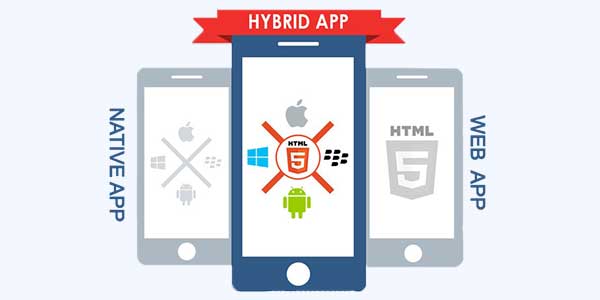
The world seems to be craving more and more apps, even better ones! Today it’s not just about having a mobile app, it’s more about competing in the digital-first world and for that, one needs to make the right choice in regards to the platform.
At first, there were apps, native to the OS, then different web apps were created for desktops. If we take a look at the big picture here, you are creating some apps featuring similar functionality on different platforms. And to be honest, creating the same look and feel for all three realms can be pretty much daunting, tiresome and not up to the mark. Now since all three platforms have different APIs, there are times when businesses end up creating something that’s not meant to be. Here’s why the need for hybrid applications arises.
If we take a close look at the present business environment then, you may find a pretty large amount of uncertainty due to a plethora of factors. As a result, a significant increase was seen and hybrid apps were pretty much in vogue. Today it may quite interest you to know that more than 70% of iOS apps are hybrid apps. Now before delving into the nitty-gritty of hybrid applications or top frameworks to keep in mind while developing hybrid apps, let us understand the basics.
Table of Contents
Introducing Hybrid Application Development:
Now I am sure you will agree with me when I say that 90% of our time we like to spend on our smartphones whether we are having a conversation or surfing the web, shopping eCommerce sites, checking out Facebook and Insta feeds, ordering lip-smacking food online and whatnot! This calls for a quick revolution and fortunately, hybrid apps seem to be trending like never before. Within a quick span of time, the concept has become pretty renowned across the globe. So you must be wondering what exactly hybrid app development is.
As the name implies, mobile app developers end up creating a hybrid app for their end users, i.e. incorporating a single code for a wide range of platforms – iOS, Android, etc. In other words, the code is written here only once and can be used anywhere and everywhere. Technically speaking, hybrid apps are nothing but said when web and native mobile applications are combined. With the help of Javascript, CSS and HTML, these kinds of apps are created. Not to mention, hybrid apps are way easier to develop and deploy.
These apps are mainly installed on a device and deployed in a native container featuring a mobile WebView object. Further below I would like to mention certain advantages offered by hybrid apps.
Core Advantages Of Hybrid Apps:
#1 Enhanced UX:
Today businesses are looking for smart ways to come up with a win-win situation where they can offer amazing services to their end users as well as gain ample return on investment. And here comes hybrid mobile app development into play! From the business point of view, it is quick and easy development, cost-effective and from the end user’s point of view, hybrid apps offer an amazing user experience irrespective of the device whether it’s Android, iOS or any other. In addition, hybrid apps tend to load content and graphics seamlessly. They tend to adapt to different device screens and due to this end users tend to stick to your app and spread the word for you.
#2 A Native-Like Experience:
The native app tends to provide an amazing and unique experience, no two ways about it! However on that note, what will you do when I say that Hybrid apps tend to offer the best of both worlds? Yes, here you can expect a native UX with a simple back-end framework. As a result, here numerous frameworks such as Flutter, React Native, Ionic, Mobile Angular, .Net Maui, Onsen UI, Cordova, PhoneGap, Kotlin, and Xamarin, are used.
And do you know what’s the best part here, it doesn’t matter whether you are working on numerous fixes and updates across different platforms, the UX tends to stay smooth. In short, the end users are entitled to get the same smooth native experience.
#3 Low-Cost:
One of the most crucial advantages of hybrid mobile app development is that it is available at quite a low price. Now the time has come when businesses no longer have to spend separately for developing multiple versions of apps for different platforms. These hybrid frameworks enable developers to create a single version instead of writing different code bases for various platforms. As a result, this saves ample time, money and energy. And in the end, you will end up making more and more revenue.
Hybrid apps in other words are nothing but the mobile version of your existing website but feature some added functionalities. So when you ask me why one must consider hybrid apps, I say when you get instant access, offline use, cross-platform, easy maintenance, and cost-effective solutions all at once, why the heck not?

How Are Hybrid Apps Different From Native Apps?
One of the obvious differences here is that native app development is mainly done for a specific dedicated operating system and programming language. For instance, Java, and Kotlin are the best examples to consider here for Android app development and for iOS, we have Swift and Objective – C.
Now till now, businesses had this misconception that Native is a way more robust and reliable approach in comparison to Hybrid. Well, things have changed to a great extent now! Being a rare combination of web and mobile app development, hybrid apps are pretty much in vogue these days. Reusable code, cost-effective, and easy to develop and deploy are some of the most crucial advantages of hybrid app development. In addition, when you try conducting native app development, it might cost around $10000 to $350000 whereas a hybrid app development project starts from $5000 to $200000. So have you made your choice yet?
With such hype about app development, more and more frameworks/technologies are being released on a daily basis. As a result, picking anything at random won’t do any good. So you have to make a deliberate choice here. Further, I would like to mention how to choose the right hybrid mobile app development framework.
Top Frameworks To Consider While Developing Hybrid Mobile Applications:
#1 React Native:
Don’t tell me you haven’t heard about React Native before. React Native is more like a Javascript Framework that is highly used for developing mobile apps, especially the ones which can run easily on both Android and iOS. Much like Reactjs, React Native is developed by Facebook. Both React and React Native are pretty much popular and ranked among the most-starred repositories on GitHub. Since its inception, the popularity of React Native seems to have increased as it is highly recommended for developing numerous mobile applications. Why React Native?
- Since it uses Javascript, developers find it easy and seamless to get started with
- Offers support of huge development community
- Speeds up the development process
- Finding bugs and issues is pretty easy and a doable job
- With maximum code reusability, waste of time, money and energy can be avoided.
- Airbnb, Myntra, Uber Eats, and Instagram, are some of the popular names using React Native to date.
#2 Ionic:
The next ideal framework to consider for developing a hybrid mobile application is Ionic. If you are planning to develop a hybrid mobile app that is fast, easy and beautiful, Ionic is one name that must be taken into consideration right away. Since its inception in 2013, Ionic has been recommended for developing high-performing hybrid apps with the help of technologies such as HTML, CSS and JavaScript. One of the most intimidating aspects of this framework is that it mainly focuses on the front part of the app development and as a result, nothing can stop your app from being user-friendly. Ionic app development won’t be just a project, it can be an asset. Further below I would like to mention certain features of Ionic app development that make it cut above others.
- It’s free and open source
- Whether you choose iOS, Android or Windows, the Ionic app is great in regards to compatibility
- Ionic has a huge community
- Easy to adopt and get started with
- Work with highly customizable components
- The framework certainly assists in boosting the performance of the app
- Robust structure and code can be managed easily
Diesel, JustWatch, Sworkit, and Honey are some of the leading names using Ionic.
#3 Flutter:
Another interesting hybrid app development framework to consider is Flutter. Introduced by the tech giant named Google, today flutter is one of the most promising names to consider in regards to hybrid app frameworks. It may quite interest you to know that Google came up with Flutter. Earlier it was meant to try to make mobile app development procedures as convenient and as seamless as possible. These days, it has been proved that Flutter has succeeded in almost every aspect of cross-platform development. The hybrid app development framework owes you a big time in regards to the cost.
Hybrid apps are developed at an exponential rate and some of them are seen to feature a very high-performance ratio. These are the ones created by using the Flutter framework. In comparison to other SDKs, Flutter seems to be extremely high quality and therefore, it successfully assists in developing action-packed and feature-rich mobile applications. Not to mention, Flutter features an extremely large community of developers and so in case, if you get stuck in between, you will always find someone helping you out right then and there.
Conclusion:
This is not just it! Lots and lots of possibilities could be explored while walking on the path of hybrid mobile app development. The key is to allow oneself to take the journey. Apps these days are found highly integrated into our lives, so lots and lots of types of apps whether it’s native, hybrid, or cross-platform apps being platform independent and scalable architecture will be found popping up in 2022 and upcoming years. I hope you did find the following post helpful and worth a read. If so, please help us in spreading the word by sharing it among your peers.
In case, if you still have any doubts or queries, feel free to mention that in the comment section below.

 About the Author:
About the Author:
















Be the first to write a comment.